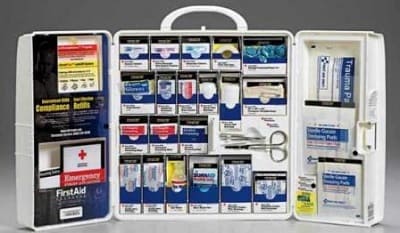Home › Diving › Lessons › Tips › First Aid Kits
DIVERS FIRST AID KIT STOCK ITEM SUPPLIES
All divers should carry an adequate first aid kit and also be familiar with its contents to ensure correct and rapid use.
We suggest that the following items should be included as a minimum.
Divers First Aid Kit.
- A Diving Emergency Handbook
- Oxygen and Appropriate Delivery Equipment
- Fluids for Rehydration
- Vinegar for Box Jellyfish Stings
- Local Anaesthetic Ointment*
- Topical Antibiotic Ointment*
- Ear Drops*
- Seasickness Tablets*
- Analgaesics*
- Systemic Decongestants*
- Topical Decongestants*
- Eye Wash
 Elastic Bandages and Pads
Elastic Bandages and Pads- Pressure Bandages and Pads
- Swabs, Crepe Bandages and Adhesive Plaster 'Bandaids'
- Scissors, Tweezers, Forceps, Sharp Knife and Needle
- Blankets, Plastic Sheets, Sleeping Bag
- Cold Packs
- Pen and Paper
- Phone Calling Card or Coins
- Flashlight
- Safety Pins
More Scuba Safety Tips |> Underwater Hand Signals |> Equalization techniques |
DIVE INJURY FIRST AID PREPARATION KIT LIST
Diving accidents and mishaps vary in severity and commonness. Some injuries are small and relatively easy to cure or treat.
It could be a 'bad luck' leg scrape on the reef or an unpleasant reaction to skin contact with jellyfish tendrils.
Nonetheless some dive accidents need emergency care and urgent medical attention.
Despite not expecting to encounter an injury or accident on every dive, you should be prepared for common casualties with some basic first aid kit supplies.
Keep these simple but essential dive rescue items in your waterproof gear bag and you are instantly ready to minimize the damage.
Simple Rescue Kit
1. Soap and Water Bottle With Fresh Water A soft plastic squeezable water bottle is used to flush out most wounded areas. Use fresh water in the first instance to help irrigate and cleanse the injury. A small tablet of soap is very handy for cleaning wounds.
2. Vinegar (white vinegar) White vinegar neutralizes jellyfish stinging venom. Irrigate jellyfish or fire coral nematocysts (with the exception of Portuguese man of war sting treatment) and bristle-worm stings with lavish amounts of vinegar to reduce pain and discomfort.
3. Tweezers and Razor or Shaving Kit A sharp razor blade or shaving kit is used to scrape away jellyfish bristles. Tweezers are the best tool to remove large jellyfish stingers and very useful for small embedded objects and splinters.
4. Bandages and Gauze Pads Bandages and gauze pads are invaluable lightweight first aid items that do not take up much room in your gear bag. Use gauze pads to keep wounds, skin blisters and hot spots clean and bandages as a compression or immobilization bandage for severe bites and stings.
5. Antibiotic Ointment and Pain Relievers Antibiotics ointments are helpful to treat topical wounds. Non-prescription pain relievers are useful to reduce pain and discomfort.
Contacting Emergency Medical Services (EMS)
Be alert for severe swelling, breathing difficulties, dizziness, rapid heartbeat or any allergic reaction after a diving accident or injury. If any adverse symptoms occur contact the local EMS or DAN emergency hotline.
More Scuba Safety Tips |> Divers First Aid Kit |> Underwater Hand Signals |> Equalization techniques |
*Consult your diving Doctor for suitable medications and advice on their use.